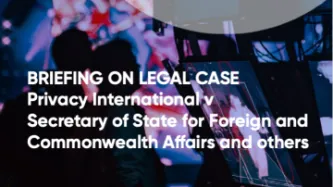Advanced Search
Content Type: Press release
French data regulator CNIL announced today a strong sanction against Criteo, one of the world's largest AdTech companies. Although close to the maximum GDPR fine, the amount of the fine was reduced from 60 to 40 million following a hearing at CNIL's offices in March 2023, during which Criteo pleaded for a reduced fine in light of its 10 million euros profit in 2022. CNIL seems to have acknowledged this argument but maintained a significant fine. This sanction follows a Privacy International…
Content Type: Advocacy
Privacy International contributed to the UNSR's report by submitting information on the work we have done as well as our Network of partners as we’ve monitored and responded to developments associated with the use of data and technology in the health care sector by governments and companies.
Content Type: Advocacy
Background
In August 2022, Amazon announced that they had entered into a definitive merger agreement to acquire iRobot, a company that specialises in designing and building consumer robots. The transaction was formally notified to the European Commission on 1 June 2023, while the UK Competition and Markets Authority (CMA) has already launched an investigation into the transaction since April 2023.
We believe that this acquisition is likely to significantly impede effective competition in and…
Content Type: Long Read
We won our case against the UK’s Security Service (MI5) and the Secretary of State for the Home Department (SSHD). The Investigatory Powers Tribunal (IPT) – the judicial body responsible for monitoring UK’s intelligence and security agencies – held that MI5 acted unlawfully by knowingly holding people’s personal data in systems that were in breach of core legal requirements. MI5 unlawfully retained huge amounts of personal data between 2014 and 2019. During that period, and as a result of these…
Content Type: Press release
In a landmark judgment, handed down today (Monday 30 January 2023), the Investigatory Powers Tribunal have found that there were “very serious failings” at the highest levels of MI5 to comply with privacy safeguards from as early as 2014, and that successive Home Secretaries did not to enquire into or resolve these long-standing rule-breaking despite obvious red flags.Human rights organisations Liberty and Privacy International, who brought this significant legal case in January 2020, have…
Content Type: News & Analysis
We have been fighting for transparency and stronger regulation of the use of IMSI catchers by law enforcement in the UK since 2016. The UK police forces have been very secretive about the use of IMSI catchers – maintaining a strict “neither confirm nor deny” (NCND) policy. In our efforts to seek greater clarity we wrote to the UK body which monitors the use of covert investigatory powers, the Investigatory Powers Commissioner’s Office (IPCO), asking the Commissioner to revisit this…
Content Type: Advocacy
PI welcomes the opportunity to engage once again with the mandate by submitting comments, evidence, and recommendations to the UN Special Rapporteur on the right to health, Ms. Tlaleng Mofokeng. We hope that our input will contribute to the forthcoming report, “Digital innovation, technologies and the right to health”.
Technology has contributed significantly to the planning and delivery of health information, services and care. We have seen the use of data and technology across the healthcare…
Content Type: Press release
The decision by the EU’s oversight body follows a year-long inquiry prompted by complaints outlining how EU bodies and agencies are cooperating with governments around the world to increase their surveillance powers filed by Privacy International, Access Now, the Border Violence Monitoring Network, Homo Digitalis, International Federation for Human Rights (FIDH), and Sea-Watch.The complainants welcome the decision by the European Ombudsman and call on the Commission to urgently review its…
Content Type: Advocacy
Privacy International responded to the consultation on the proposed data protection bill (the "Bill") to reform the current law 25.326
We welcome the continued efforts by Argentina to provide protections for the right to privacy, already enshrined in the Constitution of Argentina. PI welcomes the main objective of the Bill, namely to regulate the processing of personal data in order to guarantee fully the exercise of data subjects’ rights in accordance with Article 43 of the Constitution (…
Content Type: News & Analysis
In a judgment of 14 October 2022, the UK High Court ordered the UK Home Office to provide remedy to the thousands of migrants affected by its unlawful policy and practice of seizing mobile phones from people arriving by small boats to UK shores.
The availability and spread of new technologies, and the exponential amounts of data they generate, are regularly being abused by governments to surveil and control people - but these new forms of surveillance are only starting to make their way through…
Content Type: Advocacy
PI Opening Statement at PEGA Hearing on "Spyware and ePrivacy"
[check against delivery]
Thank you very much for offering us the opportunity to give evidence before this Committee for a second time.
Privacy International (PI) is a London-based non-profit that researches and advocates globally against government and corporate abuses of data and technology. For years we have been tracking the surveillance industry, challenging unlawful surveillance before national courts as well as the Court of…
Content Type: Press release
The European Ombudswoman, Emily O’Reilly, has launched two new investigations into Frontex, the European Border and Coast Guard Agency, and into the European External Action Service (EEAS), the EU’s diplomatic agency, in relation to their support to non-EU countries to develop surveillance capabilities and, in particular, their lack of prior human rights risk and impact assessments.
The investigations, opened on 5 October 2022, come in response to complaints filed by Privacy International,…
Content Type: Advocacy
Privacy International welcomes the opportunity to provide written input on the working draft of the WHO’s Pandemic prevention, preparedness, and response accord (“WHO CAII”) published on 13 July 2022.
This submission is based on our research and assessment of data-reliant and tech-intensive measures deployed by governments and companies in response to Covid-19 and its aftermath, which documented how these measures impacted people’s fundamental rights and freedoms, including the right to…
Content Type: Advocacy
Today, PI filed a complaint with the Forensic Science Regulator (FSR) in relation to quality and accuracy issues in satellite-enabled Global Positioning System (GPS) tags used for Electronic Monitoring of subjects released from immigration detention (GPS tags). We are concerned there may be systemic failures in relation to the quality of data extracted from tags, processed and interpreted for use in investigations and criminal prosecutions.
The GPS tags are used by the Home Office to…
Content Type: News & Analysis
Privacy International (PI) has today filed complaints with the Information Commissioner (ICO) and Forensic Science Regulator (FSR) against the UK Home Office's use of GPS ankle tags to monitor migrants released on immigration bail. This policy and practice represents a seismic change in the surveillance of migrants in the UK. PI was first alerted to this scheme by organisations such as Bail for Immigration Detainees, an independent charity that exists to challenge immigration detention in the…
Content Type: Advocacy
Privacy International (PI) welcomes the call of the Special Rapporteur on the human rights of migrants to assess the human rights impact of current and newly established border management measures with the aim of identifying effective ways to prevent human rights violations at international borders, both on land and at sea.
The issues highlighted in the call for submissions are ones that PI has been investigating, reporting and monitoring as part of our campaigns demanding a human rights…
Content Type: Press release
Meta, the largest provider of social media sites and display advertising in the UK, acquired GIPHY, the largest provider of GIFs. In its report of 30 November 2021 the CMA found that the completed merger between Meta and GIPHY will give rise to a substantial lessening of competition.
The CAT confirmed the CMA's assessment and dismissed all but one of Meta’s appeal grounds, paving the way for Meta to sell GIPHY, as demanded by the CMA.
PI was granted permission to intervene in this case, one of…
Content Type: News & Analysis
The UK government has acknowledged that section 8(4) of the Regulation of Investigatory Powers Act (“RIPA”) (which has since been repealed) violated Articles 8 and 10 of the European Convention on Human Rights (ECHR). In relation to Article 10, it specifically acknowledged that the way in which security agencies handled confidential journalistic material violated fundamental rights protected by Article 10.
As part of a friendly settlement with two applicants, the UK government acknowledged…
Content Type: News & Analysis
Background
Today judgment has been handed down in the landmark case of R (HM and MA and KH) v Secretary of State for the Home Department.
This is a Judicial Review decision concerning the UK Home Office’s secret and blanket policy of seizing mobile phones of all migrants who arrived to the UK by small boat between April 2020 and November 2020, and extracting data from all phones. PI was a third party intervener in the case.
The case revealed that migrants were searched on arrival at Tug Haven…
Content Type: Long Read
In a roundtable available on YouTube, co-hosted with Garden Court Chambers, Privacy International brought together immigration law practitioners to discuss how they’ve used privacy and data protection law to seek information or redress for their clients.Index:1. UK Border 20252. Super-complaint and judicial review challenge to data sharing3. Mobile phone seizure and extraction4. Freedom of Information Act requestsThe dystopian future: UK Border 2025To set the scene on how the future may look…
Content Type: Video
In Kenya, if you don’t have an ID, life can be extremely difficult. But for thousands of people across the country, getting an ID can be nigh on impossible. Some Kenyan citizens can’t obtain a national ID because they are registered in the Kenyan refugee database. Often referred to as victims of double registration, their predicaments reveal a deeper problem with ID itself.Now Haki na Sheria - a Kenyan organisation advocating for and supporting the victims of double registration - and three…
Content Type: News & Analysis
The notorious Clearview AI first rose to prominence in January 2020, following a New York Times report. Put simply, Clearview AI is a facial recognition company that uses an “automated image scraper”, a tool that searches the web and collects any images that it detects as containing human faces. All these faces are then run through its proprietary facial recognition software, to build a gigantic biometrics database.
What this means is that without your knowledge, your face could be stored…
Content Type: News & Analysis
What if we told you that every photo of you, your family, and your friends posted on your social media or even your blog could be copied and saved indefinitely in a database with billions of images of other people, by a company you've never heard of? And what if we told you that this mass surveillance database was pitched to law enforcement and private companies across the world?
This is more or less the business model and aspiration of Clearview AI, a company that only received worldwide…
Content Type: Video
<br />
Links
Read more about the ICO's provisional decision
Support our work
You can find out more about Clearview by listening to our podcast: The end of privacy? The spread of facial recognition
Content Type: Press release
In what could be seen as one of the strongest sanctions against the company in Europe, the Information Commissioner’s Office (ICO), which is tasked with enforcing data protection legislation in the UK, has today announced its provisional intent to issue a potential fine of £17 million against the controversial facial recognition company Clearview AI.
Clearview AI, which only received worldwide attention following a New York Times report back in January 2020, is a company whose business model…
Content Type: Advocacy
The Office of the Privacy Commissioner of Canada has developed draft privacy guidance for police agencies' use of FRT, with a view to ensuring any use of FRT "complies with the law, minimizes privacy risks, and respects privacy rights". The Commissioner is undergoing consultation in relation to this guidance.
Privacy International and the Canadian Civil Liberties Association ("CCLA") welcome the Commissioner's efforts to strengthen the framework around police use of facial recognition, and the…
Content Type: Long Read
Additionally, in January 2020 Privacy International and UK-based NGO Liberty filed a new claim against MI5 and the Secretary of State for the Home Department in the Investigatory Powers Tribunal (the “Ungoverned Spaces Case”, this time, the case sought to hold MI5 and the SSHD accountable for systemic, long-term failures in the way they handle and retain millions of people’s personal data. As part of this claim, PI requested that the IPT re-opens parts of the original BPD/BCD. This aspect of…
Content Type: News & Analysis
What happened
On 22 July 2021, the Investigatory Powers Tribunal (IPT) issued a declaration on our challenge to the UK bulk communications regime finding that section 94 of the Telecommunications Act 1984 (since repealed by the Investigatory Powers Act 2016) was incompatible with EU law human rights standards. The result of the judgment is that a decade’s worth of secret data capture has been held to be unlawful. The unlawfulness would have remained a secret but for PI’s work.
You…
Content Type: Long Read
The Grand Chamber of the European Court of Human Rights ruled that the UK government’s historical mass interception program violates the rights to privacy and freedom of expression. The Court held that the program “did not contain sufficient “end-to-end” safeguards to provide adequate and effective guarantees against arbitrariness and the risk of abuse.” As a result the Court ruled that UK law "did not meet the “quality of law” requirement and was therefore incapable of keeping the “…



























